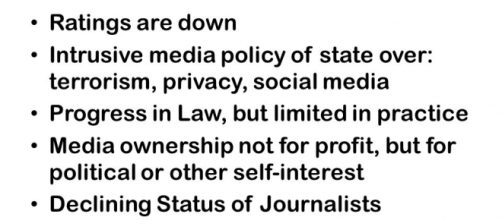I began in 1960 as a journalist, editor, and investigator. I cut my teeth in Chicago's first ward. The first feature that ever appeared about me contained an obvious error. When I asked the writer about it, he said he just wanted to add a little color. Somehow that stuck with me, a sort of tell about the profession. The subject of a medium story is less important than the creator. Making things up is OK.
Media are a spectrum
Of course, reporters of sterling integrity would not make things up. Like everything on the planet including ourselves, the media is a spectrum from the highest integrity to the depths of fakery.
And we have political leaders who have no compunctions about confusing things by Orwellian means. For Trump falsehood is anything that reflects badly on him. Trump is just the most prominent celebrity who engages in the doublespeak that George Orwell predicted,
Besieged media?
The media do not need more grief than is inflicted regularly by those for whom dishonesty is a weapon. But today's conflicted media terrain should include legitimate gripes that all media should take seriously.
The most legitimate gripe I have encountered this day is a tweet that found its way into Twitter Moments which is a gathering of significant items from the huge fund of tweets that are posted every day. Immediately below I have noted the Moment to which I will refer.
⚡️ “An open letter to the media from a former terrorist attack victim”https://t.co/E5vfm6LMKy
— Stephen C. Rose (@stephencrose) May 24, 2017
I strongly recommend that you explore this. It's a series of tweets that essentially suggests that when there is a terror attack, media (in Britain, but by extension in other locales too) become intrusive and torment anyone they think is associated with any victim of the traumatic event. I shall offer just a few of the quotes the writer offered.
Whole thread important reading. https://t.co/clbBHhoTgG
— Hugh Grant (@HackedOffHugh) May 23, 2017
When I was caught up in a terrorist incident 4yrs ago, the behaviour of UK media made the trauma much worse. They don't seem to have changed
— Em (@DrEm_79) May 23, 2017
In the face of terror, people suffer, but are strong. Emergency services and others are incredible. Media could help, rather than traumatise
— Em (@DrEm_79) May 23, 2017
They were appalling. It was beyond intrusive. It worsened the trauma and stopped me being able to access support I needed at the time.
— Em (@DrEm_79) May 23, 2017
Correctives
It is hard in a free society to suggest correctives to the appalling suggestions in these tweets.
It is a sign of having been through a century of depth-psychology that we are now dealing with things that were probably present from the days of cave-dwellers. Our insight grows and out of insight comes the possibility of change. There are a few things that might be germane.
Consideration
Media leaders could say they will not reward speed and intrusion. Reporters could slow down and remember they are not the protagonists of the narrative -- their job is to describe. Often just this delay can create stories that are massively better than getting the exact name of the exact wound to the exact person who later died. A journalist might aid the so-called war on terror better by being more considerate.
Finally, media can harm. Harm is Evil. Evil should not be rewarded. You do not need to intrude to speak truth.


